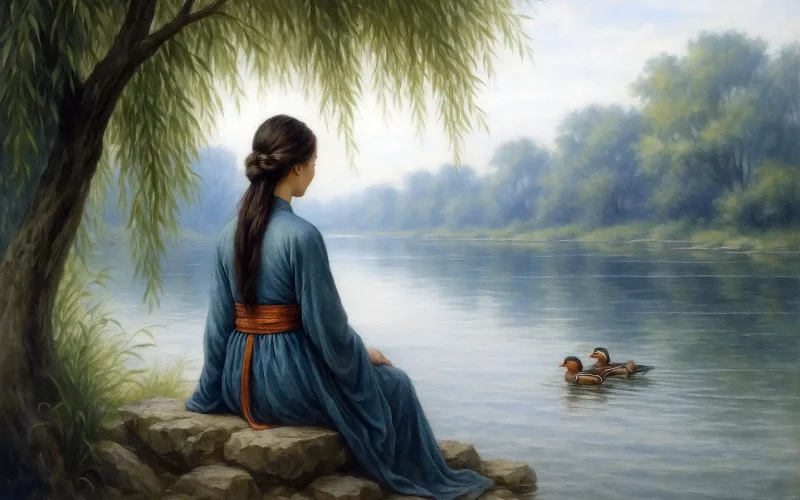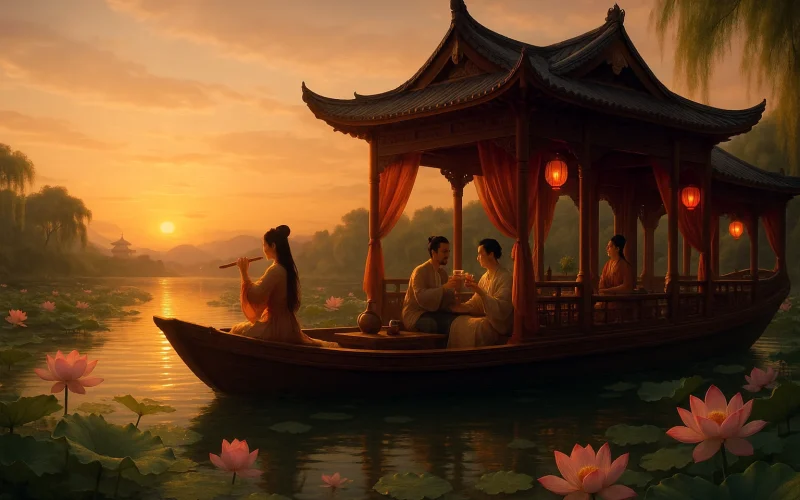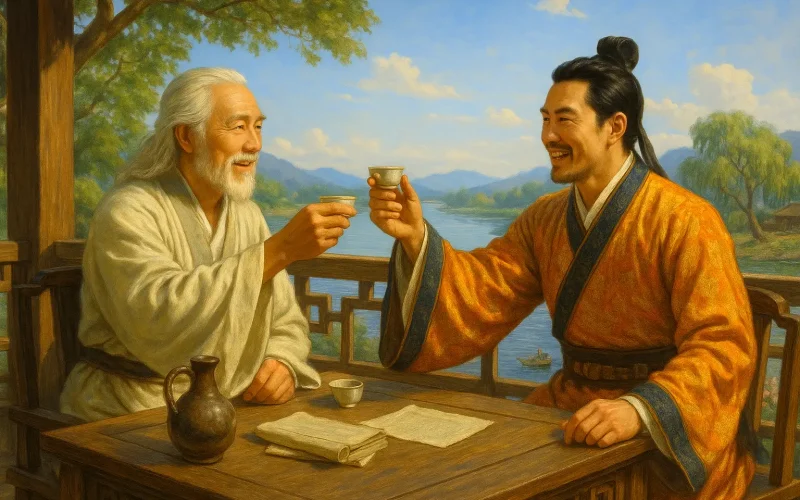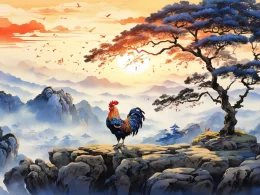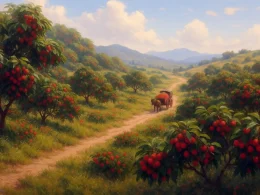Flowers like you,
Willows like you—
In blooms’ and willows’ prime, we part.
Head bowed, twin tears fall.
East flows the Long River,
West runs the Long River—
On either shore, lovebirds fly asunder.
When shall we meet again?
Original Poem
「长相思 · 花似伊」
欧阳修
花似伊,柳似伊。
花柳青春人别离。
低头双泪垂。
长江东,长江西。
两岸鸳鸯两处飞。
相逢知几时。
Interpretation
This lyrical short verse, composed by Northern Song luminary Ouyang Xiu during his politically tumultuous middle age, embodies the wanyue (婉约) style's emotional authenticity. Written amidst repeated demotions that left him physically and spiritually exhausted, the compact poem channels profound melancholy—perhaps reflecting official displacement or personal heartache. Blending folk-song directness with scholarly refinement, it stands as a masterclass in Song lyricism's poignant subtlety.
First Stanza: "花似伊,柳似伊。花柳青春人别离。低头双泪垂。"
Huā sì yī, liǔ sì yī. Huā liǔ qīng chūn rén bié lí. Dī tóu shuāng lèi chuí.
Flowers mirror her,
Willows echo her—
Spring's glory witnesses
Our severing.
Head bowed,
Twin silver threads descend.
The stanza achieves psychological synesthesia: blossoms and willows (花柳) become mimetic doubles of the beloved through repetitive "mirror" (似伊). Vernal vitality ironically frames human separation, with "twin silver threads" (双泪垂) transforming tears into tangible manifestations of shared grief—a hallmark of Ouyang's corporeal lyricism.
Second Stanza: "长江东,长江西。两岸鸳鸯两处飞。相逢知几时。"
Cháng jiāng dōng, cháng jiāng xī. Liǎng àn yuān yāng liǎng chù fēi. Xiāng féng zhī jǐ shí.
River's east,
River's west—
Mandarin ducks
On opposite shores
Take fractured flight.
When will shared wings
Realign?
The Yangtze's geographical divide (东西) morphs into emotional cosmology. The "mandarin ducks" (鸳鸯)—classic symbols of conjugal unity—appear catastrophically fragmented ("fractured flight"), their separation made visceral through the verb "fly" (飞) which ironically denotes both freedom and rupture. The open-ended query ("when?") suspends time itself, leaving resolution hovering like the ducks' unrealized reunion.
Holistic Appreciation
With just over thirty characters, this lyric poem captures the profound ache of parting with remarkable delicacy. The upper stanza depicts the sorrow of separation through poignant scenes, while the lower stanza conveys the loneliness and longing that follow, the two halves seamlessly progressing in emotional intensity. Rather than directly portraying the farewell, the poet uses spring’s beauty and natural imagery to mirror life’s impermanence, rendering the grief all the more poignant through restraint.
The poem’s power lies in its contrasts: the allure of flowers and willows against the tears of parting, the togetherness of mandarin ducks against the pain of separation. These juxtapositions create a quiet yet palpable tension. Structurally symmetrical, linguistically spare yet precise, and tonally tender yet profound, the poem resembles a minimalist ink wash—deceptively simple but dense with layered meanings of farewell, yearning, and life’s inevitable sorrows, lingering in the mind like an echo.
Artistic Merits
This lyric excels in conveying emotion through objects, embedding feeling within scenery so subtly that the boundary between the two dissolves. Its imagery—flowers, willows, mandarin ducks, the Yangtze River—is both naturally evocative and emotionally resonant, revealing the speaker’s inner state without explicit declaration. The structure is balanced, the parallelism effortless, and the rhythm fluid and melodic. Blending the musicality of folk song with the refinement of literati poetry, the poem is both singable and literary, radiating quiet emotional power.
Insights
The poem distills a timeless truth: the pain of parting and the ache of longing. On life’s journey, separation is often unavoidable, and the ties that bind us become the purest testament to human emotion. It reminds us that the deepest feelings are seldom loud or dramatic but rather quiet, persistent, and woven into the fabric of the heart. It is precisely this unyielding tenderness—the inability to let go—that composes the most moving verses in the poetry of human experience.
About the Poet
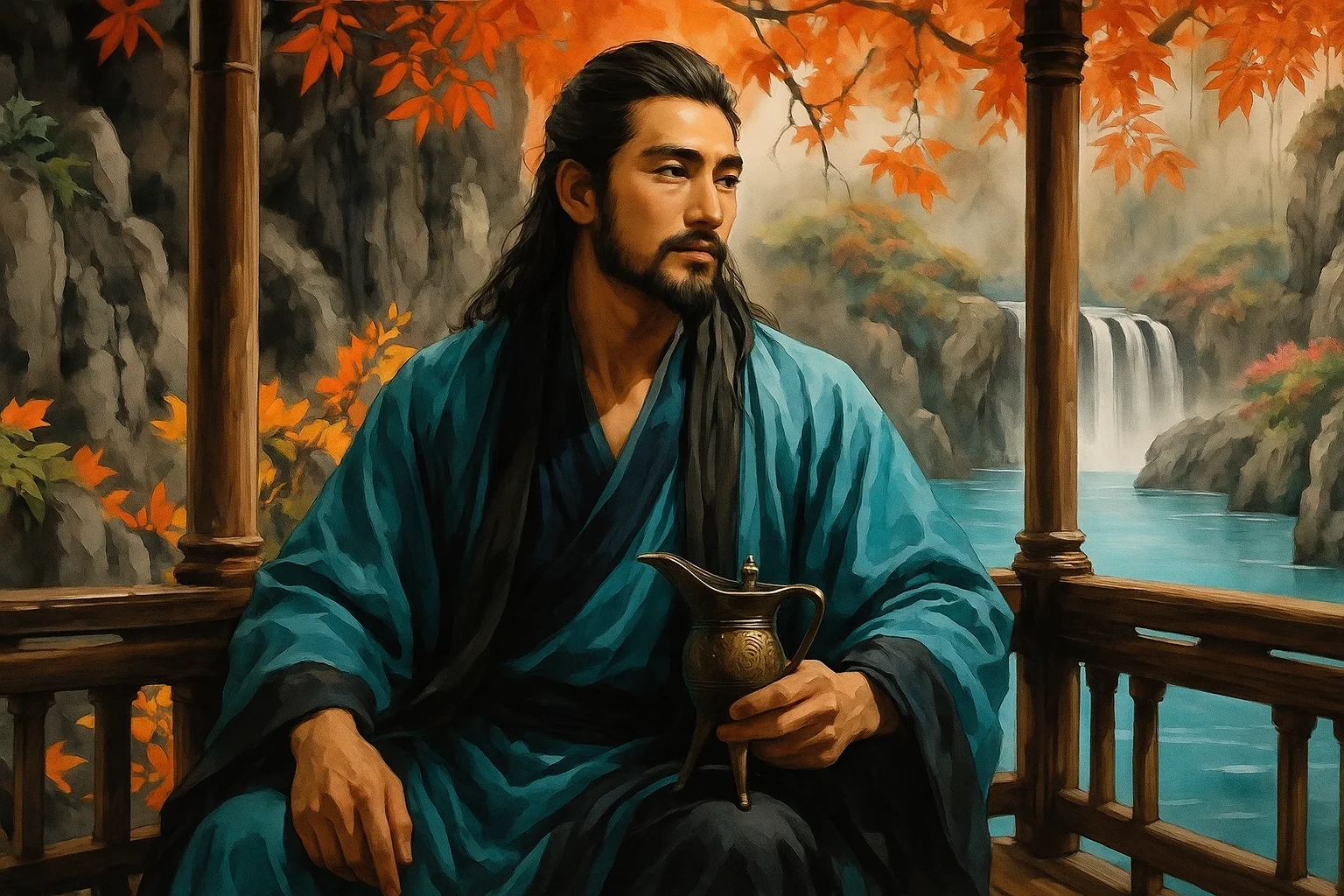
Ouyang Xiu (欧阳修, 1007 - 1072), a native of Yongfeng, Jizhou (present-day Jiangxi Province), emerged as the preeminent literary figure of the Northern Song Dynasty. After attaining the jinshi degree in 1030, he spearheaded a literary reform movement that rejected the ornate Xikun style prevalent at court. As a mentor who nurtured literary giants like Su Shi and Zeng Gong, he laid the foundation for the golden age of Northern Song literature. Recognized as one of the "Eight Great Prose Masters of Tang and Song," Ouyang stands as the pivotal figure in the transformation of Northern Song literary culture.






